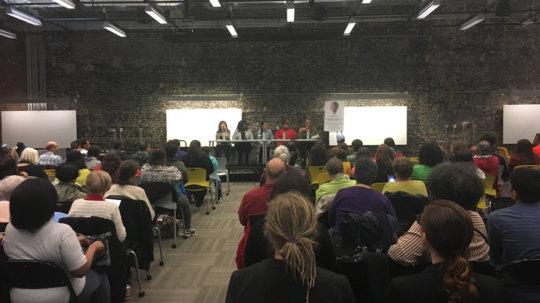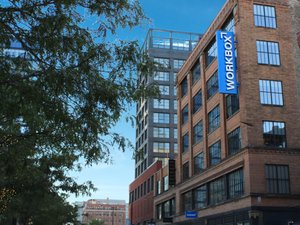
As part of the UChicago Innovation Fest, a month-long celebration of innovation, cutting-edge research and entrepreneurial activities at UChicago, the Polsky Center held a screening of Hidden Figures this past Saturday. A panel composed of four female scientists from UChicago, Fermilab and Argonne, discussing the future of women in STEM, immediately followed the film.
Hidden Figures traces the stories of three African American women, Katherine Johnson, Dorothy Vaughan and Mary Jackson, working for NASA during the Space Race. Despite segregation and discrimination, these women fought for their dreams and played key roles in the nation’s space progress. While the film is set in the Cold War period, the women panelists identified with many scenes in the movie and the experiences of the three female “computers.”
Jessica Esquivel, a Neutrino Physicist and PhD candidate from Syracuse University currently working at Fermilab, finds the scene when Katherine Johnson, soaking wet, confronted her male peers that there is no bathroom for her particularly empowering.
“[This scene] puts the struggle that I’m dealing with on a daily basis in perspective. It saddens me that my peers don’t see that there is an issue with diversity. We are standing on the shoulders of giants but there’s still a whole bunch of work that needs to be done,” said Esquivel.
Camille Avestruz, a Fellow in the Kavli Institute for Cosmological Physics and the Enrico Fermi Institute at UChicago, also resonated with the “bathroom problem” in the movie, seeing manifestations of Katherine Johnson’s experience today.
“When you are in the minority and your needs might be different from everyone else in the environment, your needs are not always easily addressed. When you are not the person in power, it’s also hard to ask for those things...it’s difficult to find mentors when you are the only female/person of color often times,” said Avestruz.
While Esquivel and Avestruz points out the problem with minority women’s lack of representation, Lei Cheng, a staff scientist at Argonne National Laboratory, notices that women are generally less assertive and confident than men in approaching and presenting their work.
“Men are always so confident. Their work doesn't need to be checked because they are always right,” said Cheng, half-jokingly referring to Paul Stafford in the movie objecting that his work be checked by a woman. “Unfortunately, self-doubt is a trait that comes with our gender. There are times when I really struggled with my career...and then I can see my male coworker just go out there and talk confidently about something totally wrong.”
Despite the many challenges women and people of color in STEM face today, the panelists offered the audience, especially young girls, some words of wisdom on pursuing their dreams. Their advice ranged from finding upward mentorship and building peer support, to putting in hard work and persisting through external biases and doubts.
All the panelists recognize that outreach is key to the future of science and is something that research institutions often overlook. They hope to continue the legacy of the three female NASA engineers and the momentum of the film into their lives by involving in outreach initiatives and mentorship activities.
“Though public speaking is not my sweet spot, I try my best to be visible...telling the kids about what I do...telling them that [STEM] is not out of their reach,” said Esquivel.
“I want to empower people who feel that they are hidden. I want to help other people be brilliant,” said Andrea Bryant, a graduate student in the Kavli Institute for Cosmological Physics at UChicago.
Picture Credit: Grace Gu








